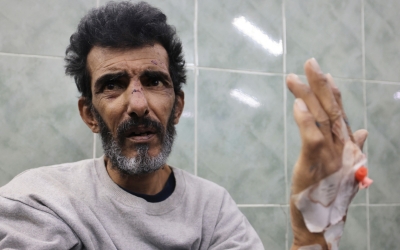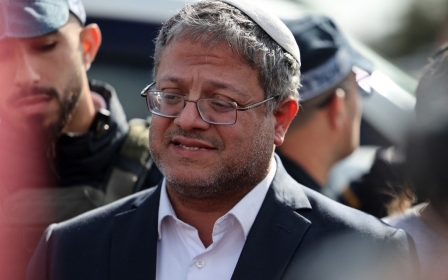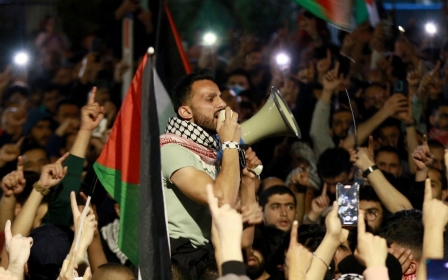US vetoes Palestine from becoming full member of the United Nations
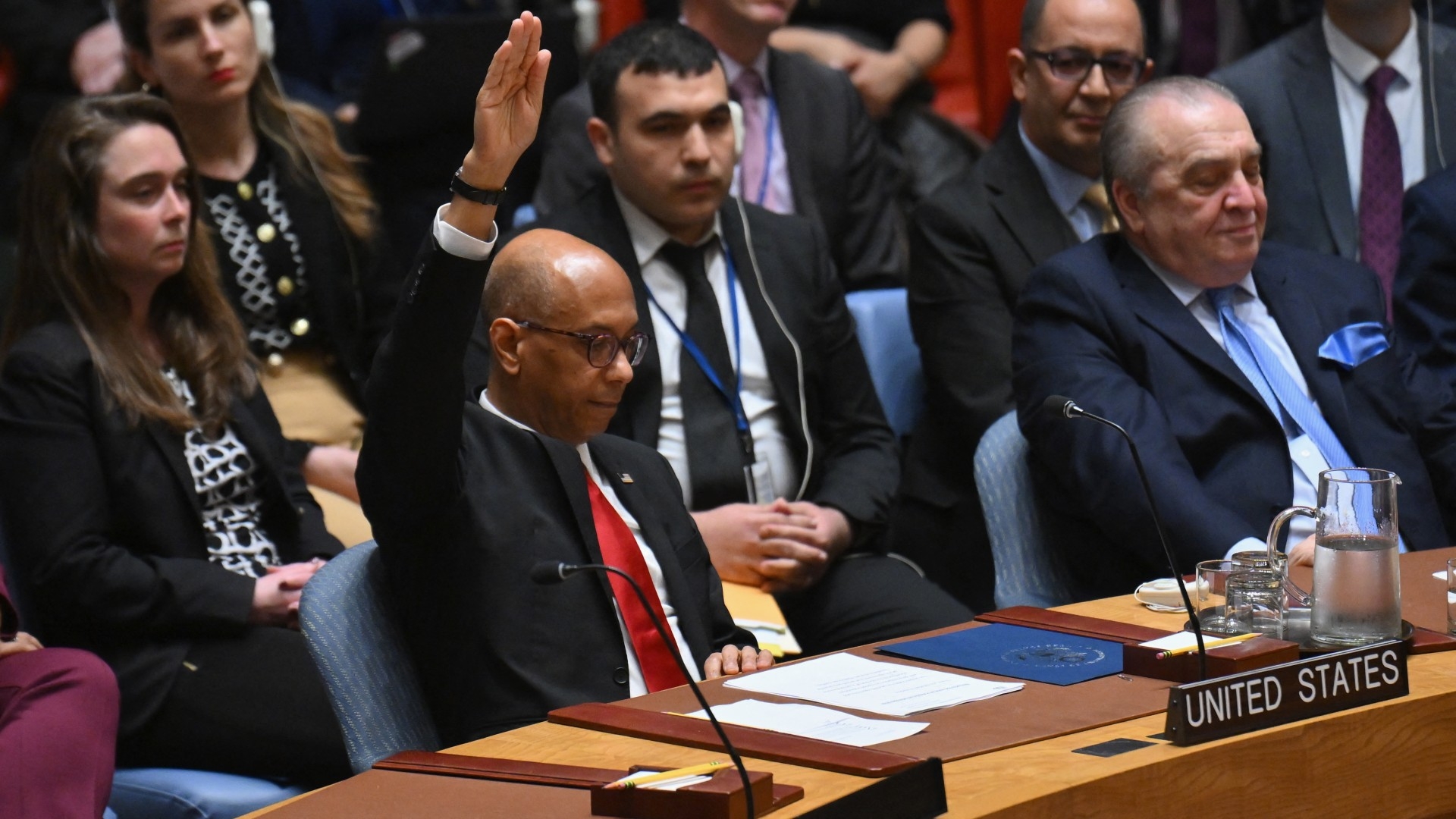
The United States vetoed a United Nations Security Council resolution on Thursday that would have allowed Palestine to be admitted as a full member of the international body and effectively recognised its statehood.
The resolution needed at least nine votes to pass and no vetoes from the five permanent members - the United States, the UK, France, Russia and China.
The proposal received 12 votes in favour, while the UK and Switzerland abstained from voting.
Russia, China, France, Japan, South Korea, Ecuador, Algeria, Malta, Slovenia, Sierra Leone, Mozambique and Guyana all voted yes. The US ultimately blocked the measure.
After vetoing the resolution, the US deputy ambassador to the UN, Robert Wood, attempted to justify the decision and appeared to cast doubt on Palestine's qualifications.
New MEE newsletter: Jerusalem Dispatch
Sign up to get the latest insights and analysis on Israel-Palestine, alongside Turkey Unpacked and other MEE newsletters
"We have long been clear that premature actions here in New York, even with the best intentions, will not achieve statehood for the Palestinian people," Wood said.
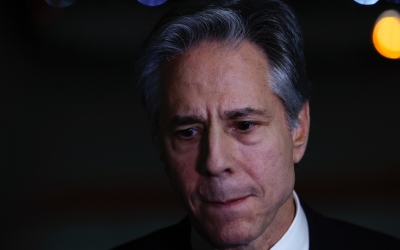
"There are unresolved questions as to whether the applicant meets the criteria to be considered a state.
"Since the attacks of October 7, President Biden has been clear that sustainable peace in the region can only be achieved through a two-state solution with Israel's security guarantee... There is no other path that guarantees Israel's security and future as a democratic Jewish state."
Russia's ambassador to the UN, Vassily Nebenzia, lashed out at the US' decision, and said the veto showed what Washington "really thinks of the Palestinians."
The US thinks "they [the Palestinians] do not deserve to have their own state," and it only realises "the interest of Israel," he said.
Nebenzia added that the US was turning a blind eye to the "crimes of Israel" amid its ongoing assault on Gaza, as well as the continuation of the illegal settlement activity in the occupied West Bank.
Hamas condemns US veto
The Palestinian group Hamas, who just hours earlier said it would dismantle its armed wing after the creation of a Palestinian state, accused the US of standing "in the face of international will" by exercising its veto power.
The group said in a statement that it condemns "in the strongest terms the American position biased towards the occupation," as it called on the international community "to exert pressure to go beyond the American will and support the struggle of our Palestinian people and their legitimate right to self-determination."
"We assure the world that our Palestinian people will continue their struggle and resistance until they defeat the occupation, take away their rights, and establish their independent, fully sovereign Palestinian state with Jerusalem as its capital," the statement added.
Since assuming office in 2021, the Biden administration has repeatedly said it wants to achieve a two-state solution to the protracted conflict. However, a recent report by The Intercept claimed that prior to Thursday's vote, Washington was lobbying other countries to reject the resolution on Palestinian statehood.
"It remains the US view that the most expeditious path toward a political horizon for the Palestinian people is in the context of a normalization agreement between Israel and its neighbors," a diplomatic cable dated April 12 reportedly said.
"We believe this approach can tangibly advance Palestinian goals in a meaningful and enduring way."
Meanwhile, earlier on Thursday, a report in Wall Street Journal said the Biden administration was pushing for a deal that would see Israel express a "new commitment to Palestinian statehood" in exchange for Saudi Arabia normalising relations with Israel.
'Failure to make progress will only increase volatility'
At the start of the Security Council meeting on Palestine's membership status, UN Secretary General Antonio Guterres told the council that the ongoing war on Gaza, as well as the recent escalations between Iran and Israel, had made it more important to achieve a two-state solution.
"Recent escalations make it even more important to support good-faith efforts to find lasting peace between Israel and a fully independent, viable and sovereign Palestinian state," Guterres said.
"Failure to make progress towards a two-state solution will only increase volatility and risk for hundreds of millions of people across the region, who will continue to live under the constant threat of violence."
His comments were echoed by South Africa's deputy representative to the UN, Marthinus Van Schalkwyk, who said the international community must avoid stiflling "the very existence of the State of Palestine."
South Africa has been among the staunchest opponents of the Israeli war on Gaza, and has led the case before the ICJ accusing Israel of committing genocide against the Palestinians in the besieged enclave, and requesting provisional measures to end the war.
On 26 January the ICJ issued provisional measures calling on Israel to refrain from impeding the delivery of aid into Gaza and improve the humanitarian situation. It also ordered Israel to take all measures within its power to prevent acts of genocide in the besieged enclave and to punish incitement to genocide.
Thursday's vote came more than six months into Israel's bombardment of the Gaza Strip, which has killed more than 33,000 Palestinians and plunged the coastal enclave into a humanitarian catastrophe.
The latest food security report by a UN-backed initiative found that the entire population of Gaza, estimated to be around 2.3 million, is enduring "acute" food insecurity while half the population suffers from a greater level of food insecurity classified as "catastrophic".
Middle East Eye delivers independent and unrivalled coverage and analysis of the Middle East, North Africa and beyond. To learn more about republishing this content and the associated fees, please fill out this form. More about MEE can be found here.


